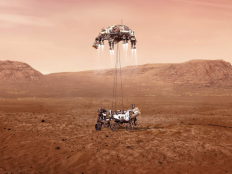All Space Articles
Showing 406 - 420 of 491 results
Curiosity Daily Podcast: How Music Affects Your Work, Damage from Muffled Hearing, and Earth’s Gigantic Atmosphere
Learn about why the Earth’s atmosphere extends beyond the moon; whether you should listen to music while you work; and whether your muffled hearing after a concert means you damaged your ears.
Curiosity Daily Podcast: Moviegoers Blink in Sync, Rain on the Sun, and Why Flamingos Stand on One Leg
Learn about a new discovery about rain on the sun; why flamingos stand on one leg; and why you blink the way you do when you’re watching a movie.
Curiosity Daily Podcast: Your Wounds Heal Faster in the Daytime, Only Tame Foxes on Earth, and the Peter Principle
Learn about why your wounds heal faster in the daytime; the Peter Principle, which explains why so much goes wrong; and why there’s one tame population of foxes on Earth, and what they’ve taught us about evolution.
Curiosity Daily Podcast: Exercising for Different Body Types, New England Vampire Panic, Non-Vertical List Benefits, and Constellations on Mars
Learn about how your body type affects the way you should exercise; the New England Vampire Panic; what our constellations would look like if we saw them from Mars; and the benefits of writing a better, non-vertical list to organize your thoughts.
Curiosity Daily Podcast: Beliefs That Boost Grades, Optimism for Better Sleep, and Planets More Habitable Than Earth
Learn about why there could be planets even more habitable than Earth; an online class that boosted grades by changing students’ beliefs; and why optimism may lead to better sleep.
Curiosity Daily Podcast: The Habitable Epoch, Mars 2020’s Search for Life, and 4 Research-Based Personality Types
Learn about why the universe may have been teeming with life billions of years ago; why NASA’s Mars 2020 Martian rover mission is going to be a huge milestone; and four personality types people fit into, according to new research.
Curiosity Daily Podcast: Why Pockets Are Rare in Women’s Clothes, Why Earth Twinkles, and Where Life Originated
Learn about why Earth twinkles from space; why pockets are so rare in women’s clothes; and whether the first life emerged on land or water.
Curiosity Daily Podcast: Why Women Feel More Pain than Men, Why Toothpaste Makes Food Taste Bad, and Earth Formed Way Faster Than We Thought
Learn about why things taste bad after you brush your teeth; a new discovery about how fast the Earth formed that may mean good things about life in the universe; and why women may experience more pain than men.
Curiosity Daily Podcast: This Artificial Sun Is Hotter Than The Real Sun
Learn about an artificial sun that’s hotter than our actual sun; whether math really is a universal language; and what words like “fresh” really tell you about how fancy your food is.
Curiosity Daily Podcast: Rice TV Screen, Satellite Warfare, Unraveled DNA
Do you want to know about a new environmentally friendly way to make TV Screens, what future space warfare might look like, and how we have finally completely unraveled the human genome?
Curiosity Daily Podcast: Tree Heartbeats, Morse Code, and the Silurian Hypothesis of Ancient Earth
In this podcast, Cody Gough and Ashley Hamer discuss the following stories to help you get smarter and learn something new in just a few minutes:
Curiosity Daily Podcast: Pretzel History, How Earth Got Its Water, Runner’s High Origins, and Words Named After People
Learn about where the water on Earth might have come from; the surprising history of the pretzel, including the monk who invented it; words you probably didn’t know are named after people; and where “runner’s high” comes from, and whether it’s genetic.
Curiosity Daily Podcast: Game Transfer Phenomena (w/ Angelica Ortiz de Gortari) and the Methane Spike on Mars
Learn how a newly detected methane spike on Mars may change our understanding of the red planet; and how you can participate in a new research study on game transfer phenomena, with researcher Angelica Ortiz de Gortari.
Curiosity Daily Podcast: Why Asthma Gets Worse at Night, Earth’s Largest Living Thing
Learn about a heroic experiment that helps explain asthma getting worse at night; and the largest living thing on earth.
NASA's Biggest 2021 Milestones
From making history on Mars to supersonic aircraft, NASA continues to astound us with science from this past year.














